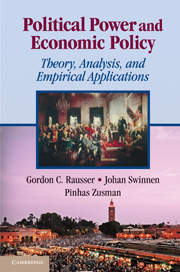Book contents
- Frontmatter
- Contents
- List of Figures
- List of Tables
- Preface
- PART 1 POLITICAL POWER AND ECONOMIC ANALYSIS
- PART 2 IDEOLOGY, PRESCRIPTION, AND POLITICAL POWER COEFFICIENTS
- PART 3 ANALYSIS OF SPECIFIC STRUCTURES
- PART 4 EMPIRICAL APPLICATIONS OF POLITICAL POWER ESTIMATION
- 20 Political Econometrics
- 21 The Political Econometrics of the Israeli Dairy Industry
- 22 Flexible Policy Instruments Given a Political-Power Distribution
- 23 Estimating Statistical Properties of Power Weight Parameters and Their Temporal Shifts
- 24 The Role of Institutions in the Joint Determination of PERTs and PESTs
- References
- Index
21 - The Political Econometrics of the Israeli Dairy Industry
Published online by Cambridge University Press: 05 June 2012
- Frontmatter
- Contents
- List of Figures
- List of Tables
- Preface
- PART 1 POLITICAL POWER AND ECONOMIC ANALYSIS
- PART 2 IDEOLOGY, PRESCRIPTION, AND POLITICAL POWER COEFFICIENTS
- PART 3 ANALYSIS OF SPECIFIC STRUCTURES
- PART 4 EMPIRICAL APPLICATIONS OF POLITICAL POWER ESTIMATION
- 20 Political Econometrics
- 21 The Political Econometrics of the Israeli Dairy Industry
- 22 Flexible Policy Instruments Given a Political-Power Distribution
- 23 Estimating Statistical Properties of Power Weight Parameters and Their Temporal Shifts
- 24 The Role of Institutions in the Joint Determination of PERTs and PESTs
- References
- Index
Summary
Introduction
In Chapter 20, we have presented a general approach to the quantitative analysis of a political economy. In the present chapter, we illustrate the political-econometric concepts presented in the preceding chapter and demonstrate the estimation of key parameters of the political power structure. The empirical analysis focuses on the Israeli Dairy Program prevailing during the 1960s and 1970s. Although this program has been modified in recent years, much of it is still in effect. Several econometric studies of the relevant economic structure have been conducted over the years. These studies are integrated in building our representation of the economic structure of the Israeli dairy economy. The political structure is formulated and analyzed utilizing the basic political-econometric conceptual formulation of Chapter 20. The empirical results are particularly interesting because they highlight the principal-agency problem that frequently arises when the political agent representing an interest group does not faithfully represent those interests.
The Israeli Dairy Program
Government intervention in the Israeli dairy market during the 1960s and 1970s was significant and consistent. Imports of dairy products were limited to the bare minimum and were subjected to a sizable duty. Farm prices for raw milk were guaranteed at rather high levels, so that production of raw milk had to be controlled through a system of production allotments. Consumer prices were set at low levels, which failed to cover processors' total costs (raw material plus processing costs), requiring the government to offer substantial subsidies.
- Type
- Chapter
- Information
- Political Power and Economic PolicyTheory, Analysis, and Empirical Applications, pp. 411 - 423Publisher: Cambridge University PressPrint publication year: 2011



